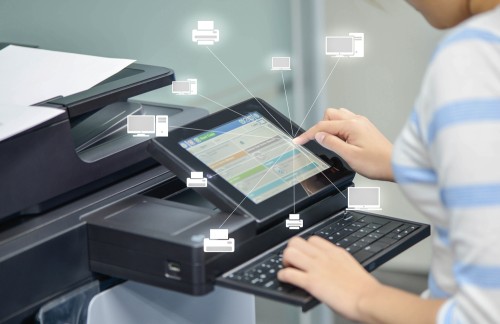In today’s fast-paced business environment, productivity is key to success. From small startups to large corporations, every organization strives to optimize efficiency and streamline workflows. One often-overlooked area that significantly impacts productivity is printing.
Managed Print Services (MPS) have emerged as a game-changer in modern offices, offering solutions that go beyond simply managing printers and copiers. Let’s delve into how MPS enhances productivity and contributes to the smooth operation of contemporary workplaces.
Centralized Management and Monitoring
One of the primary benefits of MPS is the centralized management and monitoring of printing infrastructure. Instead of dealing with multiple vendors, contracts, and supplies, MPS consolidates everything under one umbrella.
IT teams can remotely monitor devices, track usage patterns, and anticipate maintenance needs. This centralized approach saves time and resources, allowing employees to focus on their core tasks rather than troubleshooting printer issues.
Optimized Workflows
Managed Print Services (MPS) have emerged as a game-changer in modern offices, offering solutions that go beyond simply managing printers and copiers.
Automated workflows ensure that documents reach the right destination in the right format, saving valuable time and minimizing errors. Employees can access documents faster, collaborate seamlessly, and complete tasks more efficiently.
User-Friendly Printing
Complex printing setups can hinder productivity as employees struggle to navigate unfamiliar devices or troubleshoot errors. MPS simplifies the printing experience with user-friendly interfaces and intuitive features.
Mobile printing capabilities enable employees to print from their smartphones or tablets, whether they’re in the office or working remotely. This convenience ensures that employees can access documents whenever and wherever they need them, enhancing productivity on the go.
Proactive Maintenance
Printer downtime can disrupt workflow and cause delays in critical tasks. With MPS, proactive maintenance is a key feature. Remote monitoring tools detect issues before they escalate, allowing technicians to address them promptly.
Regular maintenance and firmware updates ensure that printers operate at peak performance, minimizing the risk of unexpected breakdowns. By keeping printers running smoothly, MPS maximizes uptime and productivity.
Cost Control
Unmanaged printing can lead to unnecessary costs, from excessive paper usage to inefficient device utilization. MPS helps control costs by implementing print policies, such as duplex printing or restricting color usage.
By tracking usage and analyzing printing habits, organizations can identify areas for cost reduction and implement strategies to optimize resources. This proactive approach to cost control frees up budget for other business priorities while ensuring that printing operations remain efficient.
Environmental Sustainability
Modern offices are increasingly conscious of their environmental footprint. MPS contributes to sustainability efforts by promoting paperless workflows, reducing paper waste, and implementing energy-efficient printing practices.
Through features like automatic duplexing and defaulting to black-and-white printing, MPS helps minimize resource consumption and carbon emissions.
By adopting eco-friendly printing practices, organizations not only reduce their environmental impact but also contribute to a healthier planet.
Enhanced Document Security
Security is paramount in today’s business landscape, especially when it comes to sensitive documents.
MPS offers advanced security features such as secure print release, user authentication, and encryption to protect confidential information.
By ensuring that documents are only accessed by authorized personnel, MPS minimizes the risk of data breaches and unauthorized access.
Employees can confidently print, scan, and share documents without worrying about compromising sensitive information, thereby boosting productivity without sacrificing security.
Customized Solutions for Unique Needs
Every organization has its own unique requirements and challenges when it comes to printing. MPS providers offer customized solutions tailored to specific business needs, whether it’s managing a fleet of printers across multiple locations or integrating with existing IT infrastructure.
By understanding the intricacies of each organization’s workflow, MPS delivers personalized solutions that maximize productivity and efficiency.
This bespoke approach ensures that businesses get the most out of their printing infrastructure, leading to greater overall productivity.
Remote Management and Support
In today’s increasingly remote work environment, the ability to manage and support printing infrastructure from anywhere is crucial. MPS offers remote management and support capabilities, allowing IT teams to troubleshoot issues, install updates, and perform maintenance tasks without being physically present. Whether employees are working from home, on the road, or in the office, MPS ensures that printing operations remain seamless and uninterrupted, thereby maintaining productivity regardless of location.
Scalability and Flexibility
As businesses grow and evolve, their printing needs may change. MPS offers scalability and flexibility to adapt to changing requirements, whether it’s adding new devices, adjusting print volumes, or expanding into new locations.
With MPS, organizations can easily scale their printing infrastructure up or down as needed, without the hassle of managing additional equipment or resources. This agility enables businesses to stay nimble and responsive to market demands while maintaining high levels of productivity.
Conclusion
In the digital age, where every minute counts, managed print services play a crucial role in boosting productivity in modern offices.
By centralizing management, optimizing workflows, providing user-friendly solutions, ensuring proactive maintenance, controlling costs, and promoting environmental sustainability, MPS enables organizations to operate more efficiently and effectively.
As businesses continue to adapt to evolving work environments, integrating MPS into their operations will be key to staying ahead of the curve and achieving long-term success.






